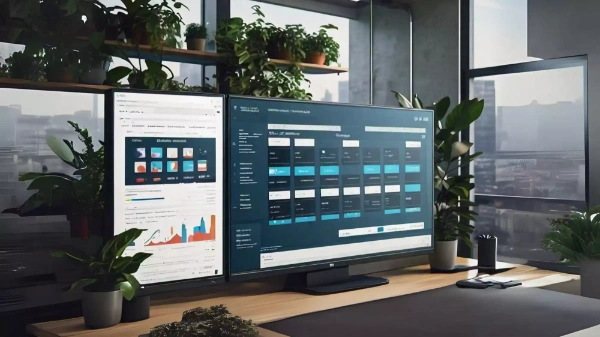
Cloud-based Enterprise Resource Planning (ERP) systems have revolutionized how businesses manage their operations. Offering flexibility, scalability, and cost-effectiveness, cloud ERP solutions are becoming increasingly integral to modern business strategies. As technology evolves, the future of cloud-based ERP systems promises even more innovations and enhancements. This blog explores emerging trends, the future landscape, and how businesses can prepare for the next generation of cloud-based ERP systems.

Artificial Intelligence (AI) and Machine Learning (ML) are poised to revolutionize cloud-based ERP systems. AI-driven predictive analytics will significantly enhance decision-making by forecasting trends and potential issues, enabling businesses to better anticipate market changes, optimize inventory, and improve financial planning with greater accuracy. Additionally, ML algorithms will automate routine tasks, such as data entry, invoice processing, and customer support, reducing manual effort and increasing operational efficiency. These advancements will streamline processes, improve accuracy, and provide businesses with more intelligent insights for strategic decision-making.
Future cloud-based ERP systems will see more seamless integration with other systems and technologies. As the Internet of Things (IoT) continues to expand, ERP systems will integrate with IoT devices to provide real-time data and insights, improving the management of supply chains, manufacturing processes, and asset tracking. Additionally, the adoption of API-driven architecture will enable ERP systems to easily connect with third-party applications and services, enhancing functionality and interoperability. This will allow businesses to streamline operations, improve data accuracy, and access a wider range of integrated tools for better decision-making and efficiency.
As cloud-based ERP systems evolve, data security and compliance will continue to be top priorities. Enhanced encryption techniques, AI-driven threat detection, and automated compliance monitoring will significantly strengthen data security, offering businesses robust protection against cyber threats and data breaches. Additionally, future ERP systems will include built-in compliance tools that help businesses stay aligned with evolving regulations such as GDPR, CCPA, and industry-specific standards. These advancements will ensure that sensitive data is safeguarded while maintaining adherence to legal and regulatory requirements.
As cloud-based ERP systems evolve, advanced analytics and business intelligence (BI) capabilities will be more deeply integrated. Real-time analytics will enable businesses to gain immediate insights into their operations, facilitating agile decision-making. Dynamic dashboards and interactive visualizations will provide comprehensive data views for more informed choices. Additionally, self-service BI tools will empower users to create custom reports and analyses independently, reducing dependency on IT departments and allowing for quicker, data-driven decisions across various business functions.
The user experience (UX) and interface design of cloud-based ERP systems will continue to evolve, focusing on enhancing accessibility and ease of use. Modern ERP systems will feature intuitive and user-friendly interfaces, making them easier to navigate and reducing the learning curve. Customizable dashboards and role-based views will further personalize the user experience, allowing employees to focus on the data that matters most to them. Additionally, with the growing demand for mobile access, ERP systems will offer more robust mobile functionalities, enabling users to manage and access their ERP data seamlessly from smartphones and tablets, supporting flexibility and on-the-go decision-making.
Scalability and flexibility will be key characteristics of future cloud-based ERP systems. Elastic scaling will allow businesses to dynamically adjust system resources in real-time, ensuring that the ERP system can accommodate varying workloads without any performance degradation. This will enable businesses to respond to fluctuating demands more efficiently. Additionally, flexible deployment options will provide organizations with the ability to deploy ERP systems in hybrid or multi-cloud environments. This approach offers greater flexibility in managing data and applications across different platforms, enabling businesses to optimize their infrastructure, improve performance, and ensure better business continuity.
Cloud-based ERP systems will integrate with emerging technologies like blockchain and AR/VR. Blockchain will enhance data integrity and secure transactions, while AR/VR will provide immersive training, virtual product demos, and advanced data visualization, improving user interaction and decision-making.
Cloud-based ERP systems are evolving with more flexible pricing models. Subscription-based models are becoming increasingly popular, offering businesses predictable costs and regular updates. This allows for easier budgeting and access to the latest features. Additionally, pay-as-you-go pricing is gaining traction, enabling businesses to pay only for the resources they use. This model supports cost efficiency and scalability, catering to the growing need for flexibility in cloud solutions.
The future of cloud-based ERP systems is poised for significant advancements, driven by innovations in AI, integration capabilities, data security, and user experience. As businesses navigate these changes, they must stay informed about emerging trends and adapt their strategies to leverage the full potential of cloud-based ERP solutions.
By embracing these future developments, businesses can enhance their operational efficiency, make more informed decisions, and maintain a competitive edge in an increasingly digital landscape. Preparing for the next generation of cloud-based ERP systems will ensure that organizations are well-equipped to meet evolving challenges and seize new opportunities.
Let Quantazone help you modernize your operations today!